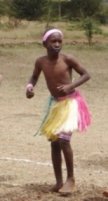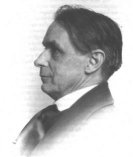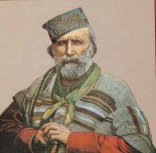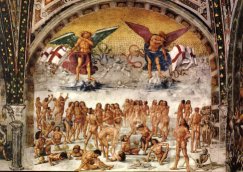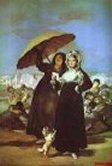Features
The Twin
Towers and the Space Between: September 11 Revisited by Gisela Wielki
Our passage into the twenty-first
century enables us to view the twentieth century in its entirety. We can
already sense that it will enter history as an outstanding epoch. The entire
century bears witness not only to the crossing of new frontiers and the
“breaking of seals,” but also to our loss of orientation. We have entered
worlds that had been inaccessible for lack of knowledge or technological tools. When the painter Kandinsky
learned about the splitting of the atom in 1906, he became deeply agitated, and
wrote, “The collapse of the atom model was equivalent, in my soul, to the
collapse of the whole world. Suddenly the thickest walls fell. I would not have
been amazed if stone appeared before my eye in the air, melted, and became
invisible.” Humanity has since come to live
with the prospect of nuclear annihilation. Early in the century, psychoanalysis
pushed open the door to the human unconscious, and spiritual science pointed
the way from sensible into supersensible realms. Then, as early as 1948, the
British astronomer Fred Hoyle took note of yet another frontier that humanity
was about to cross, when he wrote, “Once a photograph of the earth, taken from
outside, is available … a new idea as powerful as any in history will be let
loose.”.. Read more
A Day of Horror - Terror in Norway by Tarjei Straume
"Resistance
to the organized mass can be effected only by the man who is as well
organized in his individuality as the mass itself." ( -- Carl
Gustav Jung)
I've always loved this maxim by Jung.
It makes me feel good about myself. But after last week, I shudder
when I think of what psychopaths may read into it. The mass
executioner of young people, age 15 to 34, had quoted John Stewart
Mill: “One person with a belief is equal to the force of
100,000 who have only interests.” It goes without
saying that self-proclaimed secularists, i.e. atheists or
non-believers in anything religious, are citing this as a typical
example of what "true believers" are made of, and that
belief is, ipso facto, unhealthy and dangerous...Read more...
Fiction
The Adjustment Bureau by Philip K. Dick
It
was bright morning. The sun shone down on the damp lawns and
sidewalks, reflecting off the sparkling parked cars. The Clerk came walking
hurriedly, leafing through his instructions, flipping pages and frowning He
stopped in front of the small green stucco house for a moment, and
then turned up the walk, entering the backyard.
The dog was asleep
inside his shed, his back turned to the world. Only his thick tail
showed. "For heaven's sake" the Clerk exclaimed, hands on his hips. He tapped
his mechanical pencil noisily against his clipboard. "Wake up, you
in there." The dog stirred. He came slowly out of his shed, head first, blinking
and yawning in the morning sunlight. "Oh, it’s you. Already?"
He yawned again.
"Big doings." The Clerk ran his expert finger down the traffic-control sheet.
"They're adjusting Sector T137 this morning. Starting at exactly
nine o'clock."...Read more
The Adjustment Bureau Revisited by Frank Thomas Smith
Natalie
was an especially impressionable child. Now we know that almost all
children are impressionable in that when small they have difficulty
differentiating what is real from what is fiction or fantasy. Once,
when she was seven, her father took her to a puppet show in which
the devil – or a devil – had a part. When he appeared
wagging his red tail and laughing wickedly, Natalie hid under her
seat and wouldn't come out until the devil was gone. So
you can well understand why – when she was thirteen – she
was so impressed by the film: “The Adjustment Bureau”.
She knew of course that it was fiction and was based on a short story
by Philip K. Dick. Her kid brother, Billy, who was only eleven,
opined that the adjustment guys, as he called them, were “scary
as hell”. Natalie soon set him straight by explaining that the
Adjustment Bureau worked to correct human folly; so actually they
were the good guys, even though their methods were
somewhat...well...extreme... Read more
Current Events
Playing Ball with the Pentagon by Andrew Bacevich
Fenway
Park, Boston, July 4, 2011. On this warm summer day, the Red
Sox will play the Toronto Blue Jays. First come pre-game
festivities, especially tailored for the occasion. The ensuing
spectacle -- a carefully scripted encounter between the armed forces
and society -- expresses the distilled essence of present-day
American patriotism. A masterpiece of contrived spontaneity,
the event leaves spectators feeling good about their baseball team,
about their military, and not least of all about themselves --
precisely as it was meant to do...Read more
Bradley Manning - American Hero by Chase Madar
We still don’t know if he did it or not, but if
Bradley Manning, the 24-year-old Army private from Oklahoma, actually supplied WikiLeaks
with its choicest material -- the Iraq War logs, the Afghan War logs, and the State
Department cables -- which startled and riveted the world, then
he deserves the Presidential
Medal of Freedom instead of a jail cell at
Fort Leavenworth.
President Obama recently gave one of those medals to retiring Secretary of Defense Robert Gates,
who managed the two bloody, disastrous wars about which the
WikiLeaks-released documents revealed so much. Is he really
more deserving than the young private who, after almost ten years of
mayhem and catastrophe, gave Americans -- and the world -- a far
fuller sense of what our government is actually doing abroad?
Read more
Education
The Rudolf Steiner School in Nairobi, Kenya by Judith Brown
The Rudolf Steiner School, Mbagathi, has just over 300 children - ranging in age from three to fifteen years. The school lies on the dry flat plains, situated south of the Nairobi National Park, where lions are still free to roam and are heard regularly; giraffes silently graze the acacia trees nearby. The children are generally in extreme poverty, they often lack sufficient food and other basic requirements. Living close to Nairobi we feel the cost of living rising fast. Recently prices have rocketed partly due to the drought situation in this region of the world. Driving too is more stressful as the roads are not adequate for the increasing traffic...Our children, mainly from disadvantaged homes, are brought to the school and sponsorship is found for those unable to contribute; they pay what they can. Many donors from all parts of the world give regular contributions for the welfare and education of our children. Without them we could not manage. Thanks to their generous support we are able to provide stability, joy and a sound education.... Read more
Anthroposophy
Rudolf Steiner, Anthroposophy and Waldorf Education by Heiner Ullrich
Rudolf Steiner’s reforming ideas still have an exceptionally strong, practical impact today in many spheres,
especially in education, medicine, agriculture and the pictorial arts. On the other hand, his theoretical scientific
and philosophical writings have so far met with little interest and still less acceptance in academic circles. When
his thinking does attract attention it becomes the subject of passionate controversy. Uncritical identification by
his followers contrasts with polemic and sweeping criticism by the representatives of academic research. There
seems to be no golden mean in the appraisal of Steiner’s conceptual world...Read more
Freedom and the Catholic Church - Lecture 3 of 3 by Rudolf Steiner
...Now you know that this
spiritual life which precedes our birth or conception is not
spoken of in the churches of our modern civilized world. It is
never spoken of, and for a quite definite reason. Because at a
certain point of time, which coincides with that of Greek
evolution between Plato and Aristotle, all consciousness of a
prenatal spiritual life was lost. Plato speaks clearly of that
life, but Aristotle vehemently defended the theory that every
time a human being is born on the earth a quite new soul unites
with his physical body. The Aristotelian doctrine is that for
each physically born human being a new soul is created.Now if one holds such a
view, one cannot say otherwise than that the life which begins
with death, which a person begins by throwing off his physical
body — and of this Aristotle also speaks — continues
to exist and does not again descend to earth...
Read more
La Libertad y la Iglesia Católica - Conferencia 3 de 3 por Rudolf Steiner
Por razones de fuerza mayor no contamos todavía con la traducción de esta conferencia. Los lectores que tengan interés la encontrarán aquí a partir del 11 de septiembre. Por favor disculpen la demora.
The Limits of Natural science by Rudolf Steiner - Forward by Saul Bellow
The
audience attending this series of lectures in 1920 was at once
informed by Rudolf Steiner that he proposed to consider the connections
between natural science and social renewal. Everyone
agrees, he says, that such a renewal requires a renewal of our
thinking (one must remember that he was speaking of the groping
and soul-searching that followed the great and terrible war of
1914–18), yet not everyone “imagines something clear
and distinct when speaking in this way.... Read more
Karmic Relations, Volume 1, Lecture 11 by Rudolf Steiner
Our
studies of karma, which have led us lately to definite individual
examples of karmic relationships, are intended to afford a basis
for forming a judgment not only of individual human connections,
but also of more general historical ones. And it is with this end
in view that I would like now to add to the examples already
given. Today we will prepare the ground, and tomorrow we will
follow this up by showing the karmic connections. You
will have realised that consideration of the relation between one
earth-life and the next must always be based upon certain
definite symptoms and facts...Read more
Poetry
The Last Judgment and other poems by Eric G. Muller
No
escape for the naked hoard
blasted
into the abyss
with
fanfare trumpets
by
angelic cherubs
perched
on firm-thin clouds
stripping
the sinners of any
hope
Horned
hogs and wild horses
trample
the freshly fallen flesh-grapes
underneath
their horn-sickle hoofs...
...Read more
Ode to a Nighingale by John Keats
MY heart aches, and a
drowsy numbness pains
My sense, as
though of hemlock I had drunk,
Or emptied some dull
opiate to the drains
One minute
past, and Lethe-wards had sunk:
'Tis not through envy of
thy happy lot,
But being too
happy in thine happiness,
That
thou, light-wingèd Dryad of the trees,
In
some melodious plot
Of beechen
green, and shadows numberless,
Singest
of summer in full-throated ease.... Read more
Letters to the Editor
I
must confess I am most shocked! One thing is to read a biased political view
far-removed from the facts or reality of the middle-east; but to read it on a
site that harbours Steiner-articles and anthroposophical discussion, which I
see as being most enthusiastic in achieving truth, this is disappointing! I
live in Tivon, in northern Israel, and I am a student of anthroposophy for
thirty years. Summer six years ago we experienced a war. For a month, there
were missiles fired from Lebanon on all northern cities, with civilians killed
and wounded in their homes, or on their way to work, and so forth. Because it
was school holiday, many took their children and ran away to central and
southern areas. My daughter and friends still suffer from the memories of
sirens going up and down, that used to warn us to go into shelters. Missiles
have been also fired on Shderot in the south for eight years, until
"operation cast lead", two and a half years ago, has minimized this
threat...
Read more
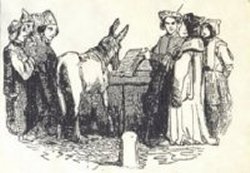
Click on the donkey to browse in the
SCR E-book Library
You can find us under the
Southern Cross constellation in the Traslasierra Valley, Province of
Córdoba, Argentina. Visitors always welcome. Just follow the sign that
reads: La Cruz del Sur.
Frank Thomas Smith, Editor
JoAnn Schwarz, Associate Editor
Contact us
Authors'
Guidelines
Archives
so we can advise you when the next issue is ready.
|








